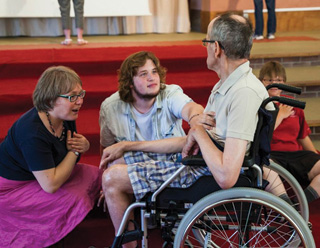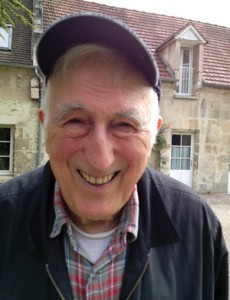Editor’s note: This is the third and final segment in a series of excerpts from an interview with Pacem in Terris Award recipient Jean Vanier at his home in Trosly-Breuil, France, on July 7. Vanier is the “beginner” of L’Arche, an international federation of communities where people with and without intellectual disabilities share life together. Vanier spoke with Catholic Messenger Editor Barb Arland-Fye just before receiving the Pacem in Terris Award from Bishop Martin Amos.

Catholic Messenger: Is it generally young people who come to be assistants (in L’Arche communities)? Is that age changing?
Vanier: There are a number of people who work with people with disabilities and who are disappointed at what they’re finding in institutions. So they come here. Others come at the age of say 20, between 20 and 25. But somewhere they have lived a failure. What do I mean by that? They wanted to get into medical school … I find that many of the assistants, volunteers, are people who have lived failure. Good people, but who have lived failure. I would say that 20 years ago people would come because they heard L’Arche was a new type of community. And so they would come because of that. But (today) the majority (of people) do not come for that. Though there are a certain number of people who have had experiences in religious orders, and are not happy with what they have found and have come here with good motivation; some of them have excellent motivation.… They have lived a failure in a religious order. But they’re very good people, young.”
Catholic Messenger: What are the key components of a L’Arche community?
Vanier: Relationship, attentiveness to growth, greater autonomy; learning, through everyday life, which would be cooking, it would also be all the personal realities (such as) taking baths, working in the workshop. It’s a quality of helping people to find greater inner peace, get over fears and anger and all the rest. Community, and through community, living together, all together, having fun. Meals are important … and the text of Jesus, that when you give a meal, don’t invite the members of your family, don’t invite your friends, don’t invite the rich people. But when you give a really good meal, invite the lame, the poor, the blind, the needy.
Somewhere with Jesus it’s a breaking through the clan. The tendency is for human beings to live in clans. So here it’s to meet people who are different. So the meal is important. Take time, eat well, have fun. Relate. Meals are important … and prayerfulness. At Cuise (la Motte, a L’Arche community not far from Trosly-Breuil, France), they have Mass every Thursday … In every foyer (or house) there would be prayer every evening. For some people this is strange, they’ve never had prayer before. Some who are welcomed here have never had any contact with Jesus and the Gospels. It’s very different in the States. Most people are religion–based somewhere, Protestant or Catholic. But here, probably the majority comes from non-religious families. So little by little they discover prayer … evening prayer is a time to be together, we pray together. In my home there was (a member who) after nine years said, ‘I’d like to get to know Jesus better,’ and he asked to be baptized. But we wait always for them to say they want to get to know Jesus … So all these elements, spirituality, prayerfulness, having fun, eating together, living together, quality of accompaniment to people with disabilities, quality of accompaniment to people who are assistants.
Catholic Messenger: What makes L’Arche different from group homes or apartments?

Vanier: I would say the quality of community life. Relationship. Being together, having fun together. It’s not just work; it’s not just doing for, it’s living with. That means it’s a new type of community. What is interesting is that I find a lot of religious communities are based on following the rule. But here there’s not too much of a rule but learning, everyone learning to love, and to love is to be patient, is to serve, is to believe all, to hope all, to excuse all. It’s a quality of relationship, and relationship is about helping the other person to become freer.
Catholic Messenger: Why are fewer assistants choosing to “live-in” with people with disabilities today?
Vanier: Fear of commitment … Why is it? I don’t know.
Catholic Messenger: I wonder what has changed over the years.
Vanier: I think also there’s the whole question of “call.” I think a lot of people come here because of a sense of call from Jesus. A lot of people come here hoping for community but not quite knowing what it is.… Here, when we began, it was almost 24 hours a day and we loved it, but this was community. We have to remember that the ‘70s were the years of community in the States; it was the hippies, the Jesus people. But that day has passed. There are no longer Jesus people, the hippies.… We’re in a world of normalization of success. The whole vision of community I would say has fallen down. Parishes are no longer communities. They’re service bases where people receive the sacraments. The idea of building something together and being concerned together … there’s a high (level of) individualism.
But still there are a lot of beautiful people. Strangely enough I would think the future of L’Arche will be a lot of couples who have tasted work and so on and seen how work in society is not going well, the stress. And now we’re seeing couples coming because they want to live community … wonderful people, deeply Christian, but they found that their family is not flowering with the world of work as it is.
Pacem in Terris ceremony
Because Pacem in Terris Award recipient Jean Vanier no longer travels overseas, a ceremony will be held Aug. 25 at 2 p.m. in the Rogalski Center at St. Ambrose University in Davenport to honor him and L’Arche, the organization he began nearly a half-century ago in France. Bishop Martin Amos, who presented the award to Vanier in France, will participate in the Davenport event. A video of the award presentation in France will be shown, and core members and assistants from L’Arche Clinton will participate in the celebration. All of our readers are invited.








